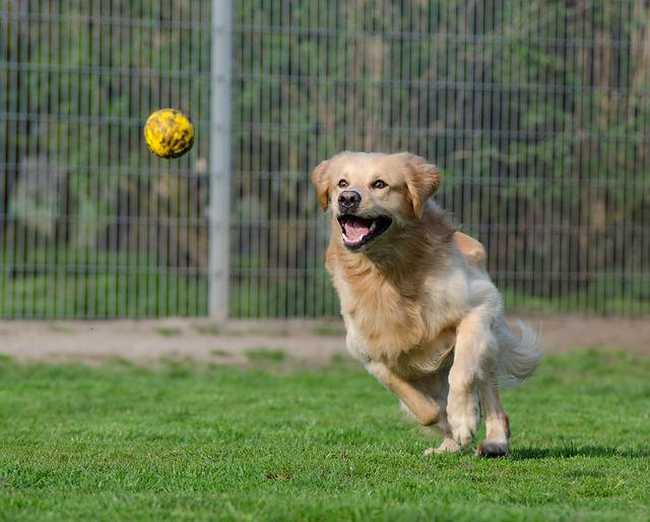How Do I Stop My Golden Retriever From Chewing?
Are you tired of finding your favorite shoes or furniture in shambles thanks to your furry Golden Retriever’s constant chewing habit? Well, you’re not alone! Chewing is a common behavior of pets, but too much of it can be a destructive and frustrating issue for their owners.
As a dog lover and owner myself, I have been through this tough journey of stopping my Golden Retriever from chewing, and I know how overwhelming it can be. But fret not, because I am here to share some helpful tips and tricks to put an end to this behavior once and for all!
First, it’s essential to understand why your Golden Retriever chews. Is it because they are anxious, bored, or teething? We’ll dive into this topic in detail and discuss ways to provide adequate exercise and mental stimulation for your pet.
Additionally, creating a safe and chew-friendly environment will also help to prevent any further damage. Positive reinforcement and training techniques will be our next discussion point and how they play an important role in stopping chewing habits. And if things don’t seem to get better, we’ll talk about seeking professional help.
So, grab your favorite drink, and let’s jump right into learning how to stop your Golden Retriever from chewing!
Understanding Why Your Golden Retriever Chews
Golden Retrievers love to chew, but why do they do it? The answer is simple – it’s a natural behavior for dogs, especially for puppies. Chewing helps them explore the world around them, relieve stress, and exercise their jaws. As they grow older, chewing becomes a way to clean their teeth and keep them healthy.
However, sometimes Golden Retrievers can take chewing to an extreme, causing damage to your belongings, furniture, and even themselves. This can be due to boredom, separation anxiety, or even teething. Understanding why your Golden Retriever chews is the first step towards stopping this behavior.
By identifying the reason behind their chewing, you can create an effective plan to control it. Providing them with the right toys, enough exercise, and mental stimulation can be key to a happier and healthier dog. Remember, chewing is a natural behavior for dogs, so it’s important to redirect their chewing to appropriate items rather than trying to completely stop it.

Providing Adequate Exercise and Mental Stimulation for Your Golden Retriever
Providing adequate exercise and mental stimulation is crucial to maintaining a healthy and well-behaved Golden Retriever. These dogs have high exercise requirements, and without proper exercise and stimulation, they tend to become bored and destructive. Here are a few tips to help you provide adequate exercise and mental stimulation for your Golden Retriever:
- Daily Walks: Golden Retrievers need at least 30-45 minutes of physical activity per day. Daily walks are a great way to provide your dog with the exercise they need.
- Engaging Toys: Golden Retrievers enjoy mentally stimulating activities, such as interactive toys, puzzles, and games. Providing these types of toys will keep your dog entertained and engaged.
- Training Sessions: Golden Retrievers thrive on mental stimulation, so training sessions are an excellent way to keep your dog’s mind active. Regular training sessions will also help strengthen the bond between you and your dog.
- Play Dates: Golden Retrievers are social animals and enjoy spending time with other dogs. Setting up playdates with other friendly dogs will provide a great opportunity for socialization while also giving your dog the exercise they need.
By providing adequate exercise and mental stimulation, you will help prevent destructive behaviors such as chewing. Remember to always supervise your Golden Retriever during their activities and provide plenty of positive reinforcement to encourage good behavior.

Creating a Safe and Chew-Friendly Environment for Your Golden Retriever
One effective way to stop your golden retriever from chewing is to create a safe and chew-friendly environment for them. This means eliminating potential hazards and providing acceptable chewing alternatives.
To create a safe environment, be sure to keep forbidden items out of your dog’s reach. Put away shoes, clothes, and other valuables you don’t want to be destroyed. Also, make sure wires and electrical cords are tucked away and out of sight.
Next, provide plenty of enjoyable chew toys for your golden retriever. They love to chew, so having safe and appealing toys will satisfy their need to chew and redirect their attention away from destructive behavior. Make sure to explore different textures and shapes of toys to keep your dog interested.
It’s also a great idea to use stimulating toys, like puzzle toys or balls that dispense treats, to keep your dog mentally engaged and prevent boredom, which can lead to destructive chewing behavior.
Lastly, if you have to leave your dog at home, consider crate training. Crates provide a secure space for your dog and can prevent them from chewing on the wrong items in your absence. Just make sure to gradually introduce crate training and never use it as punishment.
By creating a safe and chew-friendly environment, you can keep your golden retriever happy, occupied, and well-behaved.
Using Positive Reinforcement and Training Techniques to Stop Chewing
Positive reinforcement and training techniques are an effective way to address your Golden Retriever’s chewing habits. Here are some tips to get started:
- Reward good behavior: Provide treats and plenty of praise when your dog chews appropriate items like toys, bones, or chews.
- Redirect: If you catch your dog chewing on something they shouldn’t, redirect their attention to an appropriate chew toy.
- Consistency is key: Be consistent with your training methods and rewards. Reinforce good behavior consistently.
- Avoid punishment: Avoid physical punishment or negative reinforcement, which may lead to anxiety, aggression, or distrust.
- Be patient: Changing behavior takes time, and training your dog to stop chewing requires patience and repetition.
By using positive reinforcement and training techniques, you can train your Golden Retriever to break the habit of destructive chewing and encourage them to develop healthy chewing habits. Happy training!
Seeking Professional Help for Severe Chewing Behaviors
If your Golden Retriever’s chewing behavior has become severe, seeking professional help is the best option.
A veterinarian or a certified dog behaviorist can assess and diagnose any underlying medical or behavioral issues that may be causing the chewing behavior. They can also provide effective training techniques and behavior modification plans customized to your dog’s needs.
Professional help should be considered if your Golden Retriever is displaying destructive behavior, such as excessive chewing or digging, or if they have developed anxiety or stress-related problems.
It’s essential to understand that severe chewing behaviors may not go away on their own and may require professional intervention to prevent them from worsening.
Conclusion
There are several effective ways to stop your Golden Retriever from chewing on everything in sight. It’s important to understand that chewing is a natural behavior for dogs, so it’s essential to provide them with the appropriate outlets for their chewing needs.
Adequate exercise and mental stimulation, a safe and chew-friendly environment, and positive reinforcement training techniques are all useful tools for curbing destructive chewing behaviors. Additionally, seeking professional help may be necessary for severe cases.
Remember to be patient, consistent, and understanding, and with time and effort, you can successfully redirect your dog’s chewing habits.
With the right approach and mindset, you can ensure a happier, healthier, and more harmonious relationship with your furry friend.



